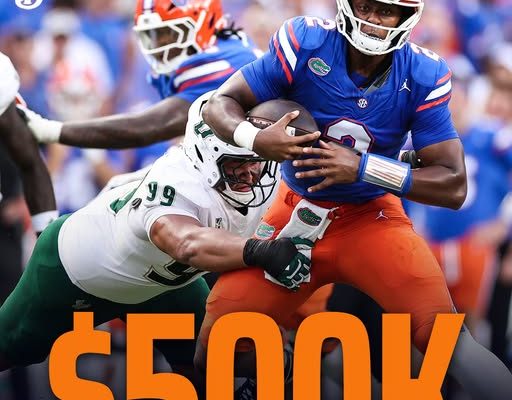Florida’s decision to pay the University of South Florida \$500,000 for their Week 2 matchup at Ben Hill Griffin Stadium in Gainesville has sparked conversation across college football circles, especially after the outcome failed to favor the Gators. The financial arrangement, which is not uncommon in modern college football scheduling, was intended to bring a competitive non-conference game to Gainesville while simultaneously benefiting USF’s program. On paper, the matchup seemed advantageous for Florida: a home game against a team perceived to be less formidable, designed to generate ticket revenue, enhance local fan engagement, and provide a solid win to build momentum for the season. Instead, the Gators faced a humbling defeat, a result that raises questions about both preparation and strategy, and shines a light on the evolving nature of college football scheduling and the risks inherent in guaranteeing pay-for-play contests.
Paying another program for a game, often called a “guarantee game,” is a standard practice in college football. Larger programs typically agree to pay smaller or mid-tier programs for a matchup that may otherwise struggle to fill stadiums, attract viewers, or secure high-profile opponents. For Florida, the \$500,000 payment ensured that USF would travel to Gainesville, providing the Gators with a scheduled opponent that ostensibly offered a high probability of a win and the associated confidence boost before the rigor of SEC play. For USF, the payout represents a significant financial infusion, supporting their athletic budget, facilities, and recruiting efforts. Yet, as with any game, outcomes on the field are never guaranteed.
The game itself unfolded in a manner that few expected. Analysts had projected Florida to leverage home-field advantage, superior talent depth, and coaching experience to dominate. Ben Hill Griffin Stadium, known for its raucous atmosphere and tradition-rich environment, was anticipated to provide a psychological edge to the home team. Fans poured into the stadium expecting a display of offensive firepower and defensive strength that would affirm Florida’s status as a rising contender. Instead, USF executed a disciplined game plan that neutralized Florida’s offensive schemes, capitalized on key mistakes, and displayed a level of execution that belied the perceived disparity between the two programs.
One of the most striking aspects of the game was Florida’s uncharacteristic errors. Turnovers, missed assignments, and failure to capitalize on scoring opportunities contributed directly to the outcome. While the Gators had the physical tools and strategic frameworks to dominate, lapses in execution proved costly. USF, conversely, played with poise and efficiency, showing that preparation, focus, and opportunism can bridge gaps in talent and resources. For Florida, this loss was not merely a setback in the standings but a reminder that paying for a game does not translate into guaranteed success.
The implications of the defeat extend beyond the scoreboard. For Florida, questions will now surround the coaching staff’s approach, the team’s mental toughness, and their ability to adapt to unexpected challenges. Paying \$500,000 for a home game that results in a loss invites scrutiny from boosters, alumni, and fans who expect tangible returns on financial investments in the program. The optics of the situation are challenging: while the payout benefited USF in a material way, Florida endured both a financial cost and a reputational hit, highlighting the inherent gamble involved in scheduling guaranteed contests.
USF, on the other hand, reaped both financial and intangible rewards. The \$500,000 payment strengthened their program’s resources, potentially aiding recruiting and operational budgets. Beyond the fiscal benefit, defeating a storied program like Florida on the road enhances the Bulls’ credibility, visibility, and recruiting appeal. Victories in high-profile games can elevate a program’s stature nationally, demonstrating that they are capable of competing against Power Five opponents. For USF, the payoff extended far beyond the monetary incentive; the on-field triumph carries long-term value in perception, media coverage, and program prestige.
The Florida-USF matchup also serves as a microcosm of broader trends in college football. As Power Five programs increasingly schedule “pay-for-play” non-conference games, the inherent risk becomes more pronounced. Historically, these matchups are designed as near-certain wins for the larger program, a chance to showcase depth, refine schemes, and provide experience for younger players. Yet, the unpredictable nature of sports means that these games can yield surprising results, forcing programs to confront the reality that money cannot guarantee performance. Upsets in guarantee games remind fans, players, and coaches alike that preparation, execution, and adaptability remain the ultimate determinants of success.
For the Gators, the loss to USF could have cascading effects on their season. Momentum, confidence, and rankings are all influenced by early-season outcomes, and a defeat in a home, pay-for-play game is particularly disheartening. Rankings in national polls are influenced not just by wins and losses but also by perceived strength of schedule and program prestige. Losing to a team outside the traditional Power Five can impact perceptions and potentially complicate postseason aspirations. Moreover, the game could influence internal team dynamics, spotlighting weaknesses in leadership, strategy, or mental resilience that must be addressed in subsequent weeks.
Fans and media commentary are likely to dissect the financial and strategic decision to host USF, questioning the wisdom of paying such a sum for a matchup that ultimately did not yield the desired outcome. While the principle of guarantee games is rooted in financial pragmatism and scheduling convenience, the outcome underscores the dual risk: financial outlay and potential reputational damage. Athletic directors and program decision-makers must weigh the benefits of such matchups against the possible consequences, considering both fiscal prudence and competitive priorities.
Looking ahead, Florida will need to recalibrate its approach, learning from the missteps revealed in this game. Analysis will likely focus on execution lapses, game-planning errors, and areas where mental toughness or preparation fell short. Coaches may also reflect on broader scheduling strategies, considering whether high-risk pay-for-play games serve the program’s long-term objectives or if alternative approaches—such as scheduling more balanced opponents or investing in homegrown talent development—could provide greater strategic advantage.
In the end, the Florida-USF Week 2 matchup serves as a compelling case study in the complexities of college football scheduling, financial arrangements, and the unpredictability of on-field outcomes. Paying \$500,000 to host an opponent may offer material and strategic benefits on paper, but as Florida discovered, games are ultimately decided by execution, preparation, and resilience. USF capitalized on their opportunity, turning a financial incentive into both a moral and competitive victory, while Florida was reminded that even the best-laid plans cannot guarantee results. The lesson resonates across the sport: in college football, money can set the stage, but performance writes the script.
This loss may sting for Florida fans, but it also offers an opportunity for growth. Teams are often defined not by flawless victories but by how they respond to setbacks, and the Gators’ ability to rebound from this unexpected defeat will be crucial in shaping the trajectory of their season. For USF, the victory will be remembered as a defining moment, a proof point of what determination, preparation, and opportunism can achieve even in the face of financial disparities and programmatic expectations. The Week 2 matchup is now part of college football lore, a vivid reminder that in sports, as in life, investment does not guarantee success—action and execution do.
The \$500,000 paid by Florida will be remembered less for the transaction and more for the unexpected outcome it produced. As the season progresses, both programs will continue their campaigns, but the lessons from Gainesville will linger. For Florida, it is a cautionary tale about complacency, assumption, and the perils of underestimating opponents. For USF, it is a celebration of strategic acumen, preparation, and the power of seizing opportunities. Ultimately, this game underscores the enduring drama and unpredictability that make college football a sport watched passionately across the nation, where even financial arrangements cannot shield a team from the surprises that unfold on the field.
The narrative of Florida paying USF \$500,000 only to be defeated will continue to reverberate in discussions about scheduling practices, game preparation, and competitive equity. College football programs across the country will watch closely, considering how financial incentives interact with competitive realities, and how such matchups might influence the broader landscape of the sport. The Week 2 loss is now a reference point, a moment of reflection and analysis for athletic directors, coaches, fans, and analysts alike, emphasizing that success in college football requires more than money—it demands execution, focus, and adaptability in every game, regardless of the circumstances.
Florida’s gamble did not pay off in the traditional sense, but the lessons extracted from the game may prove invaluable. The defeat to USF is a stark reminder that the game on the field cannot be bought, that preparation and execution remain paramount, and that every matchup carries inherent risk, regardless of financial arrangements or perceived advantages. As both programs continue their seasons, the Week 2 encounter in Gainesville will remain a notable moment—one where assumptions were challenged, expectations upended, and the unpredictable essence of college football was vividly displayed.
This unexpected outcome, though costly in multiple ways for Florida, also contributes to the richness and intrigue of the college football narrative. It reinforces the idea that no opponent should be underestimated, that investment in a game does not guarantee a return in victory, and that the sport remains thrilling precisely because of its unpredictability. The \$500,000 Florida paid may never be fully recouped on the scoreboard, but the broader implications for program management, competitive awareness, and strategic thinking are lessons that extend well beyond a single loss.
The Week 2 clash between Florida and USF will be analyzed, debated, and remembered as a moment where financial strategy, competitive assumptions, and on-field performance collided dramatically. For Florida, it is a cautionary tale; for USF, it is a triumphant story; and for college football as a whole, it is another reminder of why the sport captivates so passionately—the outcome is never guaranteed, regardless of contracts, payouts, or expectations. Every game tells a story, but some, like this one, resonate far beyond the final whistle, offering lessons, reflections, and narratives that will linger for seasons to come.
Florida’s \$500,000 payment to USF will likely be referenced in future discussions about scheduling, pay-for-play games, and risk management in college football. It demonstrates that even well-intentioned financial decisions designed to secure competitive advantage can produce unforeseen outcomes. More importantly, it underscores a fundamental truth about sports: while money can influence logistics and opportunities, it cannot dictate the unpredictable dynamics of competition. Execution, strategy, and resilience remain the ultimate determinants of success, and Florida’s loss to USF exemplifies this enduring reality in stark terms.
In retrospect, the Week 2 matchup may serve as a teaching moment for programs nationwide. It emphasizes the importance of preparation, the dangers of complacency, and the recognition that every opponent deserves respect. Financial arrangements, stadium advantages, and historical reputations provide context and expectation, but the game itself is decided in the moment, through every snap, tackle, and play call. Florida’s defeat, despite the \$500,000 investment, illustrates vividly that in college football, performance reigns supreme.
As the season unfolds, Florida will look to rebound and recalibrate, leveraging the lessons learned from this costly Week 2 setback. For USF, the victory will remain a defining highlight, a testament to their preparation, poise, and ability to seize opportunity against a prominent opponent. The financial exchange, though significant, is overshadowed by the narrative, the upset, and the strategic lessons embedded in the game. Ultimately, this encounter reinforces why college football remains one of the most compelling spectacles in sports—where outcomes defy expectations, investments carry inherent risk, and triumph can emerge from preparation, execution, and resolve.
Florida’s payment to USF and the subsequent loss will be remembered not merely as a transaction or a defeat, but as a multifaceted lesson in the realities of modern college football. It captures the interplay between financial strategy, competitive assumptions, and the unpredictability of athletic performance. In the end, the Week 2 matchup in Gainesville stands as a vivid reminder: in college football, no amount of money can guarantee victory, and the true measure of success lies in execution, preparation, and the ability to rise to the occasion when it matters most.
The story of Florida paying USF \$500,000 and losing the game underscores the thrilling unpredictability of college football. It demonstrates that even programs with historical prestige and financial resources are vulnerable to well-prepared opponents, and that every contest carries the potential for unexpected outcomes. For fans, analysts, and programs alike, it is a reminder that in sports, preparation, focus, and adaptability are priceless, and that the scoreboard, not the contract, ultimately determines success.
Florida’s Week 2 experience against USF will be remembered as a cautionary tale, a lesson in humility, and a showcase of the inherent drama that defines college football. While the \$500,000 payment was intended to secure a favorable matchup, the result revealed that competitive realities on the field are far more complex than financial arrangements or historical expectations. The encounter stands as a testament to the unpredictable beauty of the sport, where every game offers an opportunity for triumph, learning, and reflection, regardless of the cost incurred off the field.
This game, its financial context, and its surprising outcome may influence future scheduling decisions, prompting programs to reconsider the balance between guaranteed matchups, financial incentives, and competitive preparation. Florida’s loss to USF exemplifies the risks and rewards inherent in pay-for-play arrangements, serving as a reminder that in college football, the ultimate arbiter of success is the performance on the field, not the money exchanged before kickoff.
In conclusion, Florida’s \$500,000 payment to USF for a home game that resulted in a loss is more than a transactional anecdote; it is a lens through which the complexities, unpredictabilities, and strategic nuances of college football can be examined. The game serves as a vivid example of how financial arrangements intersect with competitive realities, highlighting that while money can influence logistics, it cannot ensure victory. Execution, focus, and adaptability remain the defining factors, and the Week 2 matchup between Florida and USF offers a rich, cautionary tale for programs, fans, and analysts alike.
The legacy of this matchup will endure, not because of the financial figure involved, but because it challenged expectations, disrupted assumptions, and reaffirmed the unpredictable essence of college football. Florida’s loss, despite paying USF \$500,000, underscores the fundamental truth that no opponent should be underestimated, no outcome guaranteed, and no investment can substitute for the rigor, preparation, and execution demanded on the field. The story will echo across the sport as a reminder that college football remains a theater of unpredictability, drama, and enduring lessons about competition, preparation, and resilience.
Ultimately, Florida’s gamble, and its surprising outcome, enriches the narrative of the season and the sport at large. For USF, it is a historic victory; for Florida, a moment of reflection; and for college football, a compelling example of how financial strategy, preparation, and execution intersect in sometimes unexpected ways. The Week 2 matchup is now part of the sport’s lore, a reminder that in college football, every game matters, every opponent deserves respect, and performance, not payment, determines the ultimate outcome.
Florida’s \$500,000 payment to USF and the subsequent defeat will be remembered as a vivid example of the unpredictable, thrilling, and educational nature of college football. It serves as a reminder that even the most storied programs are not immune to upsets, that financial arrangements do not guarantee competitive advantage, and that preparation, execution, and adaptability are the ultimate determinants of success. The Week 2 matchup will resonate for years as a lesson in humility, strategy, and the enduring drama of the sport, highlighting why college football remains one of the most compelling spectacles in American athletics.
For Florida, the loss is a moment to recalibrate, refocus, and apply lessons learned. For USF, it is a historic milestone, proof that preparation and opportunity can overcome disparities in resources and perception. The \$500,000 payment, while significant, is overshadowed by the narrative, the upset, and the enduring lessons drawn from the field. This encounter reinforces the timeless truth of sports: the outcome is determined not by financial investment, but by performance, execution, and resolve, and in this case, USF proved that with excellence and focus, even a favored opponent can be toppled.
Florida’s gamble may not have yielded the desired result, but it has produced a narrative rich with insights into strategy, risk, and the unpredictability of college football. The Week 2 loss to USF will remain a talking point for fans, analysts, and programs, illustrating vividly that in sports, no amount of money can substitute for preparation, focus, and execution. The game serves as a cautionary tale, a celebration of underdog triumph, and a testament to the enduring drama that makes college football an endlessly compelling spectacle.
Ultimately, Florida’s \$500,000 investment in a home game that ended in defeat demonstrates that in college football, as in life, certainty is an illusion, and success is earned through effort, preparation, and resilience rather than purchased. The Week 2 matchup against USF will stand as a memorable chapter in the 2025 season, reminding all stakeholders that while financial arrangements shape opportunities, the game itself—its unpredictability, intensity, and challenge—is the true measure of success.
Florida’s loss to USF, despite the \$500,000 paid, will echo throughout the season as a lesson in humility, preparation, and the unpredictable nature of competition. It illustrates that money can influence logistics, but cannot guarantee outcomes, and that every team, regardless of stature, must respect the fundamentals of preparation, focus, and execution. This Week 2 encounter will be remembered not just for the upset, but for its broader lessons about the essence of college football, the risks inherent in financial arrangements, and the enduring drama that defines the sport.
Florida’s gamble, and its outcome, encapsulates the delicate balance between financial incentives, competitive expectations, and the unpredictable dynamics of college football. Paying \$500,000 for a game may have seemed prudent and strategic, but the result underscores a timeless truth: no payment can replace preparation, execution, and focus. USF’s victory stands as a testament to this reality, demonstrating that skill, poise, and strategy can overcome disparities in resources and expectations. The Week 2 matchup in Gainesville will remain a compelling story, analyzed and discussed for its financial, competitive, and narrative implications, offering lessons for programs, fans, and analysts alike.
Florida’s \$500,000 investment may not have produced the intended victory, but it has created a rich narrative that underscores the unpredictability and educational value of college football. The defeat to USF is a reminder that success is never guaranteed, that every opponent deserves respect, and that preparation, execution, and adaptability remain the ultimate determinants of achievement. As the season continues, both Florida and USF will carry forward lessons from this game, a reminder of the complex interplay between financial strategy and on-field performance, and of why college football remains an endlessly captivating spectacle.
Florida’s loss to USF, after paying \$500,000 for the matchup, will stand as one of the season’s defining moments, illustrating the unpredictable, thrilling, and instructive nature of college football. It reinforces the reality that financial arrangements can facilitate opportunities but cannot dictate outcomes, and that preparation, execution, and resilience are paramount. The Week 2 encounter will be remembered as a lesson in humility, strategy, and the enduring drama that makes college football one of America’s most compelling sports, and a reminder that the game is ultimately decided by what happens on the field, not by contracts signed off it



